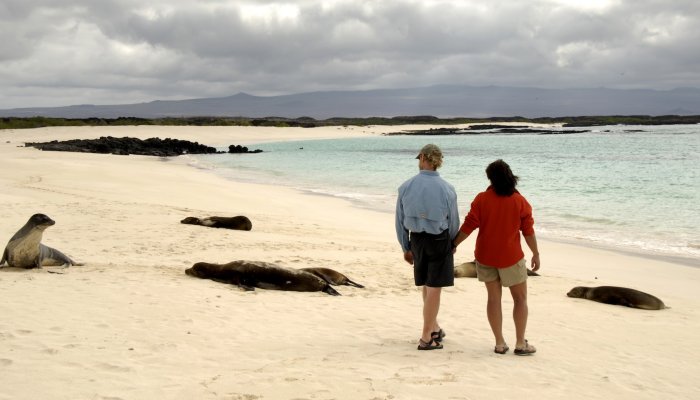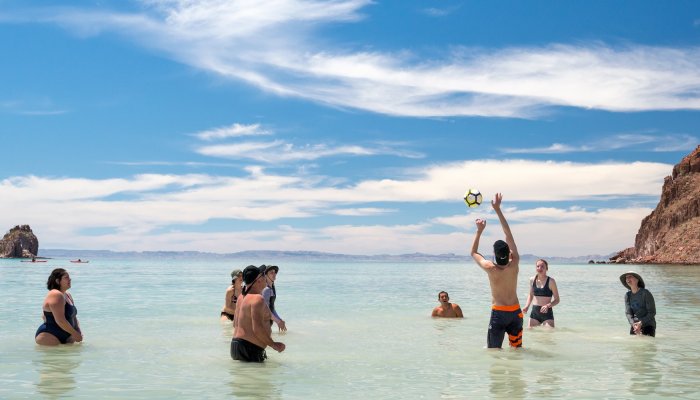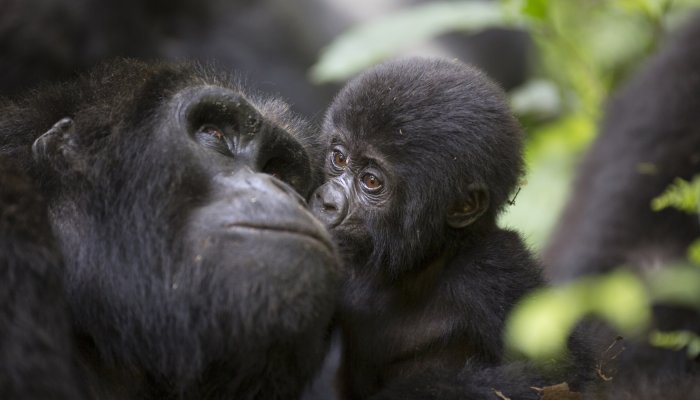A Beginner’s Guide to Planning Your First African Safari
An African safari is something many people dream about, and it’s easy to see why. Up-close wildlife encounters, beautiful landscapes, and rich cultural experiences make traveling to Africa an adventure like no other. But with so many places to go and things to do, planning your first safari can start to become overwhelming.
At Adventure Unbound, we’ve spent years crafting custom safari itineraries across Africa and have learned a lot along the way. This guide brings together some of our top tips to help you confidently plan your first safari.

Choose Your Safari Style
The ideal safari trip is one that is unique to your interests and travel style. Luckily, there are options for just about all interests and all types of travelers visiting Africa. Here are some of the experiences you might consider for your first safari:
- Classic Game Drives: These traditional safaris are the quintessential African wildlife experience. From the comfort of specially designed safari vehicles, you’ll explore savannahs, grasslands, and bushland habitats with the goal of spotting animals like giraffes, zebras, lions and more.
- Big 5 Safaris: Specifically designed to showcase Africa's “Big Five” – lions, elephants, rhinos, leopards, and buffalo – these safaris are a great option for wildlife lovers. Parks like Kruger National Park in South Africa and the Serengeti in Tanzania offer prime Big Five viewing opportunities, perfect for wildlife photography and stories that will last a lifetime.
- Gorilla Trekking: You can head to the dense forest of Rwanda’s Volcanoes National Park, Uganda's Mgahinga Gorilla National Park, or seldom-visited Gabon, for an experience tailored to those who are keen on seeing large primates. Each of these places have guided treks to observe families of mountain gorillas in their natural habitat.
- Boat or River Safaris: In destinations like Botswana’s Okavango Delta, boat safaris offer a unique way to experience Africa's wildlife. You’ll drift through waterways with the chance to observe elephants drinking at the banks, hippos lounging in the shallow waters, and a large array of birds. Boat and river safaris are all about slow, peaceful cruising and those unforgettable moments that travelers live for.
- Cultural Safaris: These experiences blend the excitement of wildlife viewing with immersive cultural exchanges. Visit local tribes and communities, participate in traditional dances, taste regional cuisine, and gain deeper insights into the daily lives and traditions of African cultures. Cultural safaris offer a mix of meaningful human connection and classic safari moments for a well-rounded experience.
- Family Safaris: Perfectly tailored for families, these safaris balance wildlife viewing with fun, engaging activities suitable for younger adventurers. Enjoy shorter game drives, interactive learning opportunities, and exciting experiences such as bush tracking, storytelling around the campfire, and hands-on conservation activities.
- Walking Safaris: For those looking to slow things down and connect with nature on a new level, walking safaris are a unique way to experience Africa. Led by knowledgeable guides and trackers, you’ll explore on foot, noticing the smaller details that can be easy to miss in a vehicle. It’s a quieter, more immersive way to observe the wildlife and environment around you.
Find Your Perfect Destination
Once you have a sense of the kind of safari experience you’re after, the next step is figuring out where to go. Each country offers its own unique blend of landscapes, wildlife, and cultural experiences. At Adventure Unbound, we offer trips across some of Africa’s most incredible safari destinations, including Rwanda, Zambia, Tanzania, Kenya, Gabon, South Africa, Botswana, and Namibia. For first-time safari-goers, we recommend the following destinations:
- South Africa: With excellent infrastructure, diverse wildlife, and the world renowned Kruger National Park, South Africa is a great choice for first-timers. Many travelers will begin their journey in Cape Town, where you’ll find a vibrant culture, delicious food, and stunning coastal views before heading into the wild. You can read our blog post, Top Places to Visit in South Africa, for more inspiration!
- Rwanda: Known for its world-class gorilla trekking in Volcanoes National Park, Rwanda also stuns travelers with its lush landscapes and welcoming energy. Visiting this amazing country offers a sense of connection, both to the land and its people, alongside some of the best primate encounters in Africa.
- Tanzania/Kenya: These neighboring countries are safari classics, home to Serengeti, Masai Mara, and the Great Wildebeest Migration. We often recommend this region for a first-time safari, as it offers some of the most iconic experiences on the continent. From start to finish, trips here are sure to check a few items off your bucket list.
Timing Your Safari Right
After deciding what experience you want to have and where you’ll be traveling to, the important piece of the puzzle is when to travel. Timing plays a big role in shaping your overall experience when it comes to wildlife, weather, pricing, and more. Here are a few key things we always consider while planning custom Africa safari adventures:
- Peak Wildlife Viewing: This generally aligns with the dry season, as animals congregate near remaining water sources making it easier for guides to predict where they will be. For many classic safari destinations - like Tanzania’s Serengeti or Kenya’s Masai Mara - June through October is considered prime time for wildlife viewing.
- Seasonal Variations: The wet (or green) season, typically from November to April, brings lush scenery, vibrant landscapes, abundant birdlife, and fewer crowds. Countries like Botswana and Kenya bloom beautifully during this period. Although wildlife might be harder to spot due to increased vegetation, the wet season offers remarkable photography opportunities and often reduced rates at lodges and camps.
- Shoulder Season Perks: Traveling in the shoulder months– usually May or November– can provide an excellent balance between wildlife sightings, favorable weather, and lower costs. These transitional months mean fewer travelers, good game viewing, and discounted rates on accommodations making it easier to enjoy a high-quality safari experience without overstretching your budget.
Budgeting for Your Safari
Safari costs vary widely depending on your choices for accommodations, activities, and destinations. At Adventure Unbound, we suggest planning for a budget of between $400 and $1,500 per person per day. This range typically includes accommodations, meals, guided game drives, park fees, and local transportation within the safari area.
Luxury lodges, exclusive experiences, and private guides usually fall toward the higher end of this spectrum. On the other hand, comfortable mid-range accommodations or group-based safaris can help lower costs while still providing an excellent experience.
Establishing your budget early will help you work within a clear framework, prioritize what’s most important to you, and ensure that your trip aligns with your expectations from the beginning.
The Value of Expert Safari Planning
Planning a custom African safari can be complex, and sometimes the best decision is to partner with a specialist. Having expert support ensures that every detail is in place while saving you countless hours of research and uncertainty along the way.
Specialists at Adventure Unbound offer invaluable insights into regional highlights, best travel seasons, unique lodging options, and cultural nuances. They take the time to understand your travel goals and preferences, building an itinerary that reflects your vision.
Working with a specialist not only streamlines the planning process but also elevates your entire experience. You’ll save time, avoid common pitfalls, and enjoy peace of mind knowing every detail has been thoughtfully handled. Contact Adventure Unbound to begin designing your unforgettable safari journey.
Preparing for Your Trip
Before you go, it’s important to make sure all your travel documents are in order. Check that your passport is valid for at least six months after your return date, and look into visa requirements for the countries you’re visiting. You’ll also want to have travel insurance and, depending on your destination, proof of any required vaccinations.
When it comes to packing, think light, practical, and breathable. Neutral-colored clothing works best for game drives, and comfortable walking shoes are essential. Don’t forget a wide-brimmed hat, sunscreen, insect repellent, and a good pair of binoculars.
Lastly, talk to your doctor about any recommended vaccinations or medications, such as malaria prophylactics, based on your travel itinerary. It's also smart to bring a basic medical kit with things like pain relievers, antihistamines, and any personal prescriptions just in case.
Bonus Tips for First-Timers
Safari life has its own rhythm—early mornings, slow and restful afternoons, and golden-hour game drives that roll into breathtaking sunsets. Embracing this pace and staying open to the unexpected can lead to some of the most magical moments of your trip. From spontaneous wildlife sightings to unplanned adventures, flexibility is key.
It also helps to truly unplug. Putting the phone down allows you to connect with the sights, sounds, and serenity of the African wilderness. These are the kinds of experiences that stay with you long after you return home.
Start Planning with Confidence
Your first African safari is more than a vacation—it’s a chance to connect with nature, culture, and adventure in a whole new way. There’s a lot to think about, but that’s part of the adventure. Use this guide to get started, and if any questions come up along the way, our team is here to help.









